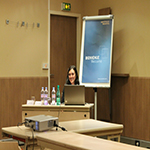Euroacademia Conferences
 Europe Inside-Out: Europe and Europeanness Exposed to Plural Observers (9th Edition) April 24 - 25, 2020
Europe Inside-Out: Europe and Europeanness Exposed to Plural Observers (9th Edition) April 24 - 25, 2020 Identities and Identifications: Politicized Uses of Collective Identities (9th Edition) June 12 - 13, 2020
Identities and Identifications: Politicized Uses of Collective Identities (9th Edition) June 12 - 13, 2020 8th Forum of Critical Studies: Asking Big Questions Again January 24 - 25, 2020
8th Forum of Critical Studies: Asking Big Questions Again January 24 - 25, 2020 Re-Inventing Eastern Europe (7th Edition) December 13 - 14, 2019
Re-Inventing Eastern Europe (7th Edition) December 13 - 14, 2019 The European Union and the Politicization of Europe (8th Edition) October 25 - 26, 2019
The European Union and the Politicization of Europe (8th Edition) October 25 - 26, 2019 Identities and Identifications: Politicized Uses of Collective Identities (8th Edition) June 28 - 29, 2019
Identities and Identifications: Politicized Uses of Collective Identities (8th Edition) June 28 - 29, 2019 The European Union and the Politicization of Europe (7th Edition) January 25 - 26, 2019
The European Union and the Politicization of Europe (7th Edition) January 25 - 26, 2019 7th Forum of Critical Studies: Asking Big Questions Again November 23 - 24, 2018
7th Forum of Critical Studies: Asking Big Questions Again November 23 - 24, 2018 Europe Inside-Out: Europe and Europeanness Exposed to Plural Observers (8th Edition) September 28 - 30, 2018
Europe Inside-Out: Europe and Europeanness Exposed to Plural Observers (8th Edition) September 28 - 30, 2018 Identities and Identifications: Politicized Uses of Collective Identities (7th Edition) June 14 - 15, 2018
Identities and Identifications: Politicized Uses of Collective Identities (7th Edition) June 14 - 15, 2018
The Youth Discourses on EU-ropeanization in the New European Countries vs. the Margins of Europe
-
-

-
Presentation speakers
- Lia Tsuladze, Tbilisi State University, Georgia
- Download presentation
Abstract:
In the proposed paper I discuss the perception of EU-ropeanization among the youth from the new European countries (the cases of Romania and Poland) vs. the margins of Europe (the case of Georgia). Based on my recent cross-cultural qualitative research, namely, the in-depth interviews and focus group discussions with Georgian, Romanian and Polish youth, I aim to illustrate how the EU-ropeanization discourses uphold the ambivalent identities promoting the construction of certain reality, in which the young people constantly negotiate between the EU-ropeanizing forces and the national. The abovementioned ambivalence is reflected in the youth narratives on the impact of the EU normative standards on their societies that tend to both regulate and confuse everyday life and of the EU-ropeanizing trends on the local traditions that tend to both encourage inventing “specificity” and endanger traditional practices. The positive outcomes of the EU integration as seen by the youth from the new European countries are both the ease of crossing the borders with new opportunities to study and work and the EU projects supporting the development of local economies and infrastructure. However, they stress that both the former and the latter have their side effects as the implementation of certain EU regulations might represent a mere performance/spectacle, while crossing the borders might produce a nation-wide “failure discourse” as a result of negative stigmatization by a recipient society. In addition, being aware of “a strong bargaining position” of Western Europe, the young people fear that under the EU influences the native traditions have to be abandoned preventing the local way of doing things. The discourses of the youth from the margins of Europe being willing to join the EU (Georgia) do resonate with the ones of their counterparts from the new European countries (Romania and Poland).
-
Related Presentations

How cosmopolitan is European Identity?
- Alexander Kustov

European Media Culture, Identities and Paradoxes of Cultural Globalization
- Liljana Siljanovska
















